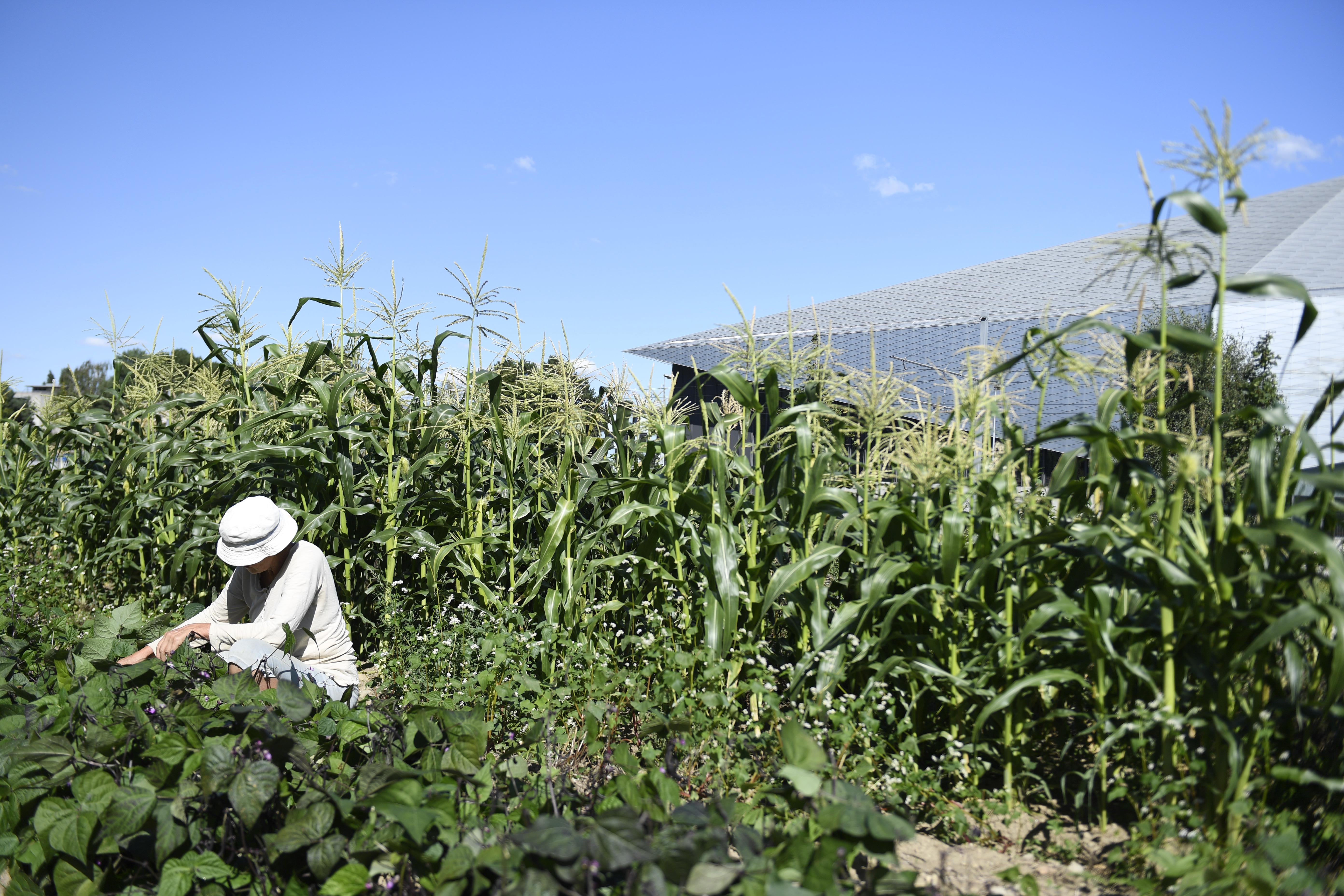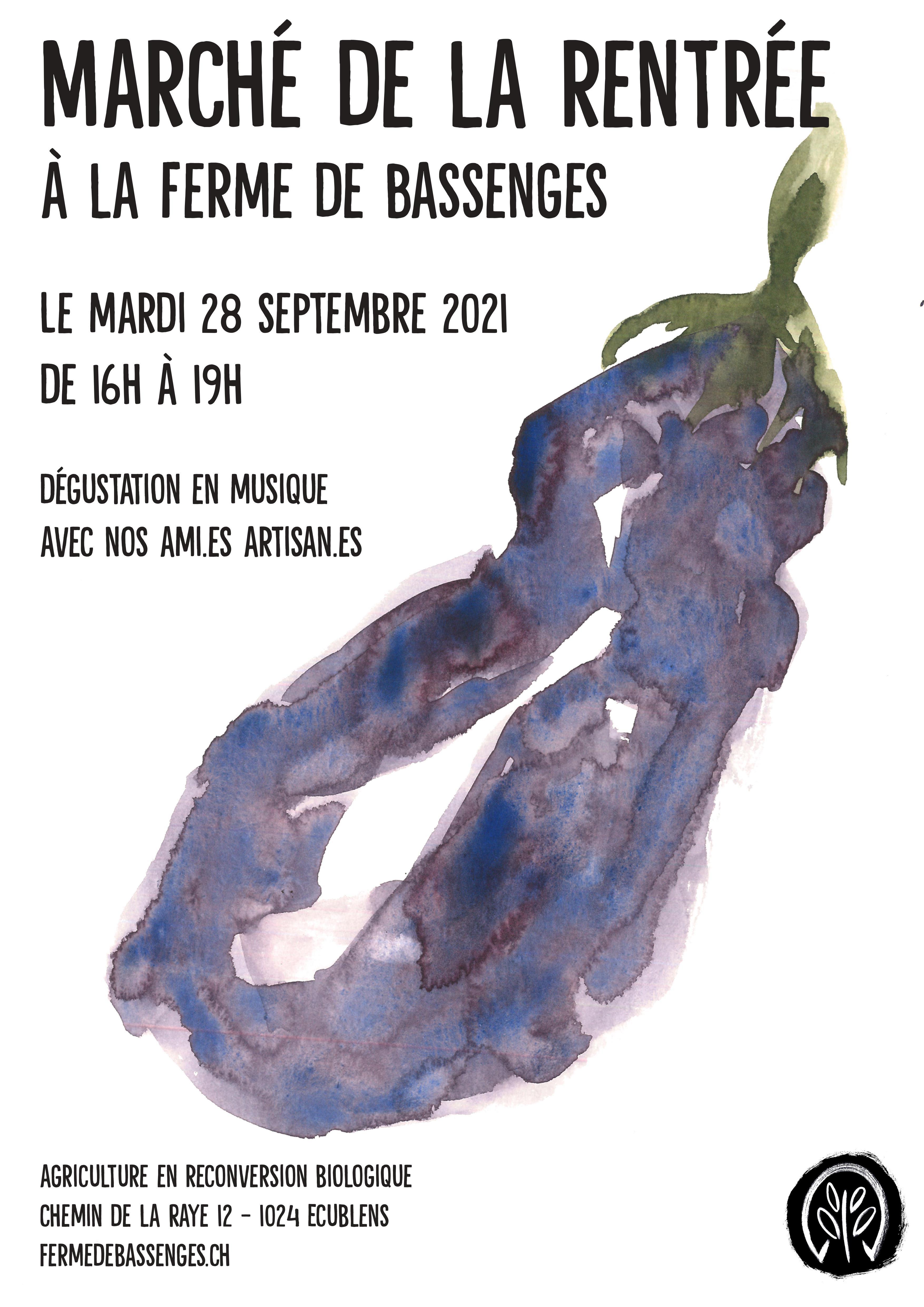
© 2021 Bassenges Farm.
At the Bassenges Farm, six devoted women and men are bringing their vision of sustainability to the EPFL and UNIL campuses, giving low-tech agriculture - without pesticides - a chance to thrive.
View the longread version of the story.
Across from the Swiss Tech Convention Center, on the other side of a long stretch of road called the Tir-Fédéral, the Bassenges farm is being transformed. Almost 3 years ago, the farm was essentially empty. Now, it's literally bustling with life.
The juxtaposition of technological society and farm-life is striking at this particular intersection in Ecublens. The imposing architecture of the convention center, the noisy traffic along the road, the metro M1 periodically passing by… It's city life as usual, until one hears the braying of the donkey, quaintly amplified as the "hee-haw"call is bounced off the walls of the massive convention center.
The contrast doesn't end at the donkey. A neighboring plot of conventionally farmed land features a perfectly aligned, robust monoculture with absolutely no weeds. At the Bassenges farm, which is working towards Bio-Suisse certification, neighbors and passerby's have witnessed horse- and mule-led tilling of the land, with farmers and volunteers manually weeding and caring for the diverse vegetable garden.

Meet the members of the Bassenges farm collective
"We don't want phytosanitary products in our fields," explains Ivanna Crmaric, an agronomist at the Bassenges farm. Bio farming allows the use of organic phytosanitary agents, but forbids the use of synthetic ones. Instead, Crmaric and colleagues make their own preparations, such as nettle macerations and herbal decoctions.
Crmaric chose agriculture because it's a concrete way to live according to her values. It's also a way - she hopes - to show that low-tech agriculture and slow economic choices are possible in our high-tech fast-paced societies. She also dreams of a Swiss research farm in sustainable agriculture, and enthusiastically refers to the example set by the research farm at the University of British Columbia, in Canada.
Crmaric is one of six invested women and men who work - and live - at the farm, raising animals and cultivating the land using organic practices, as proposed in a project that unanimously won the hearts of the EPFL-UNIL jury in December 2019. The farmlands are provided by both EPFL and UNIL on their respective campuses. Together, Crmaric and her colleagues refer to themselves as the collective of the Bassenges farm.
"Conventional agriculture feeds the plant, that's what synthetic fertilizers do, but everything that the plant doesn't absorb is washed away with the rain," explains Timothée Faes, Swiss certified farmer and trained in biodynamic farming. "Instead, we nurture the soil. We bring nutrient-rich humus to the soil to encourage diversity, from the mycorrhizae to the worms and bugs. We take care of the ecosystem for growing healthy plants, and we are inherently part of that system."
Faes brings to the Bassenges farm twenty years of experience in biodynamic farming, raising dairy sheep and making cheese. He chose this vocation to be as close to the wilderness as possible in the context of our constructed society.
Also part of the collective are three EPFL graduates in environmental engineering, Baptiste Calliari, Clément Levasseur and Tom Müller, as well as Melodi Binay, a communications graduate from the University of Fribourg.
Calliari brings to the Bassenges farm his experience in organic market gardening from a small farm in Grenoble. Calliari was an avid mountaineer, until he discovered agriculture. "Mountaineering was an escape for me but it also involved a lot of travelling. I wanted to reduce my carbon footprint, and the best way for me to find balance was to change my lifestyle."
Levasseur worked several years as an agricultural advisor, but he wanted practical experience. He was particularly interested in how to reduce tilling of the soil, as a way to maximize life in this habitat, and how to incorporate trees for the good of agriculture, a practice called agroforestry. A project at the Bassenges farm was an opportunity to seize. "Agricultural lands are scarce in Switzerland, and are often kept within families from one generation to the next," Levasseur explains. With the help of EPFL and UNIL students, they have planted over 75 trees and almost 200 linear meters of living hedges on the two campuses.
When Müller isn't working on his UNIL thesis on melting glaciers, he contributes to the farm whenever possible. He is part of the project to discover and learn as much as possible about small-scale agriculture, while experiencing community living.
Binay has always been passionate about agriculture. After her studies, she taught agriculture management and politics at the Marcelin school. Coming to the Bassenges farm was a natural step, in alignment with her convictions to reduce the tremendous amount of waste that comes from industrial practices.
An experiment in sustainable agriculture
Since inception of the project, the members of the Bassenges collective have been developing their vision of sustainable farming and living, and they're testing it directly in their practices. They meet weekly to organize the work, but also to evaluate and evolve in their tremendous sustainable experiment. The biodynamic approach, like planting according to the cycles of the moon, or concocting biodynamic sprays and preparations, is not for everyone in the collective. But that doesn't prevent Binay, Calliari, Crmaric, Faes, Levasseur and Müller from putting their heads together, bringing together their respective personalities, and implementing their common idea about organic and sustainable agriculture.
What are their guiding principles? "We aim to have circular material flow, with as little external input as possible. We aim to increase biodiversity in our farming practices, and also to minimize our carbon footprint," explains Crmaric.
Farming indeed has the potential to reduce carbon emissions. Soil organic carbon loss due to human land use can be mitigated. Just recently, the EU commission set in motion their new carbon farming initiative.
Small-scale, low-tech agriculture
The members of the collective have been at the Bassenges farm since Feruary 2020, right before COVID swept across the country, cultivating up to 9.5 hectares i.e. 8000m2 of vegetables, 15000m2 of crops such as cereal. They have been raising sheep, pigs, caring for horses, a donkey and a mule, while making cheese and fixing up the buildings on the premises.
When the stubborn mule named Greta refuses to till the field, they won't deprive themselves from using a small tractor. They remove dried popcorn kernels from the cob using a bicycle-powered grinder. They use a sunlight powered wardrobe to dry their green beans for long-term storage. They store their harvest in a cold-room that they built themselves, with the help of volunteers, out of blocks of hay and a mix of local clay. It's with their hands, every morning and every night, that they milk the sheep for making cheese, in a cheesery that they built themselves, using recycled equipment whenever possible. They also sell fresh vegetables and cheese at their Tuesday market, daily at their self-service, or through their distribution of weekly baskets of seasonal produce.
The workload is intense, vast and varied. The members of the Bassenges collective are reaping the fruits of their labor, not necessarily financially, but in terms of living according to their values. They are living off the land as much as possible. They are embracing circular living and a slow-economy. They are exploring what it means to practice low-tech sustainable agriculture, and they are doing it across from one of the most technical universities in Switzerland. Future synergies are promising.







